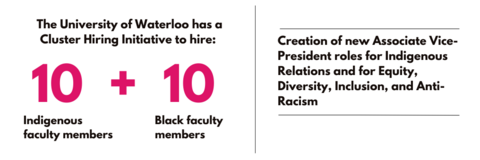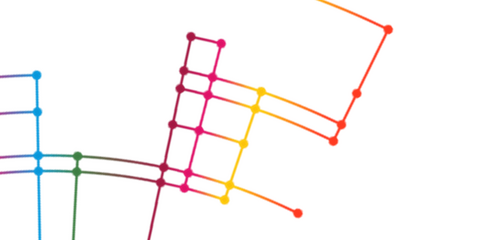REDUCE INEQUALITY WITHIN AND AMONG COUNTRIES

SDG 10 aims to reduce inequalities of income, opportunity, mobility and societal inclusion through policies, regulations, monitoring, and financial aid. The focus at the University of Waterloo is on ensuring that all members of the community have equitable and affirming access to its services.


President’s Anti-Racism Taskforce
The objective of the President’s Anti-Racism Taskforce is to address systemic racism in all its forms at the University of Waterloo, and to ensure this work is led by members of Black, Indigenous, Persons of Colour (BIPOC) communities. The Taskforce is dedicated to amplifying BIPOC voices and learning from their insight and experience. Engagement and transparency not only with these community members, but with everyone on campus, will also continue to be hallmarks of this work and all that the university does.
Office of Equity, Diversity, Inclusion & Anti-Racism
The Office of Equity, Diversity, Inclusion & Anti-racism (EDI-R) builds, incubates and enhances EDI-R competency and capacity across campus to identify and interrupt institutional barriers and embed equity within policies, processes, environments, and experiences at the University of Waterloo.
AccessAbility Services
AccessAbility Services is the University’s centralized office for managing academic accommodations for students with disabilities. The Office works with the campus to remove barriers in the academic environment and support equitable access to education by designing and facilitating academic accommodation plans, and offering accommodation supports that increase student capacity for personal success. Disability covers a broad range of conditions that can be permanent, temporary, and suspected, including physical disabilities, learning disabilities, mental health disabilities, medical conditions, and trauma.

Conflict Management and Human Rights Office
The Conflict Management and Human Rights Office acts as a focal point and resource to all members of the university community regarding matters of harassment, discrimination, and other general forms of conflict.
Indigenous Relations
Indigenous Relations is a central hub for First Nations, Inuit, and Métis students, researchers, faculty, and staff, along with allies within the Waterloo campus community. Additionally, the Office of Indigenous Relations provides the campus community with guidance, support, and resources to strengthen the shared vision of reconciliation. They work collaboratively on- and off-campus to not only advance the goals of the Truth and Reconciliation Calls to Action, but also to create a long-term vision for the University that is grounded in decolonization.
Waterloo Indigenous Student Centre
The Waterloo Indigenous Student Centre is committed to providing support to Indigenous students at the University of Waterloo. The centre provides supports to Indigenous students through a holistic lens: cultural, academic, wellbeing, and social engagement. The Centre provides an environment that is supportive, respectful, inclusive, and welcoming for all Indigenous students on campus.
Research Institute for Aging
The Schlegel-University of Waterloo Research Institute for Aging is a charitable, non-profit organization dedicated to enhancing the quality of life and care of older adults. The Institute tackles some of the biggest issues facing an aging population by driving research and innovation to improve education and practice. They develop and share solutions that make a difference to benefit older adults everywhere.
